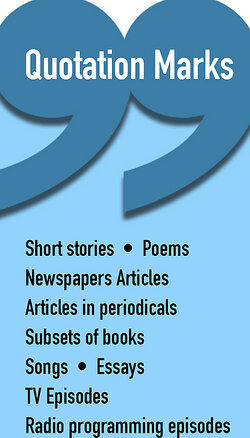Quotes Vs Quotations

A quotation is a section of the text/speech from the source you are using. For example, “It was a dark and stormy night.” A citation is the credit you give to the author/creator of that source, as you are using their work in your own. For example, the citation for the quote above would be “L’Engle, Madeleine. Explore Quotation Quotes by authors including Oscar Wilde, Dorothy L. Sayers, and Ambrose Bierce at BrainyQuote. 'Most people are other people. Their thoughts are someone else's opinions, their lives a mimicry, their passions a quotation.' To introduce a word or phrase used as an ironic comment, as slang, or as an invented or coined expression. Use quotation marks the first time the word or phrase is used; thereafter, do not use quotation marks. 91) Let’s take these cases one by one. An ironic comment is one that means something other than (often the opposite of) what it says.
Quotation marks can be used to express measurements. A single quotation mark denotes a foot, while the double quotation mark follows the inches. For example: 5’4″. Technically, the marks used with measurements are called a prime and double prime, and they are straight whereas quotation marks are curly.
You're probably familiar with quotation marks - those double scoops in the air (“”), used before and after we relay something someone said or wrote, verbatim. Pretty standard in writing, but what about their slimmer offshoot, single quotation marks (‘’)? While single quotation marks aren’t used that frequently, they do serve an important purpose.
Using Single Quotation Marks
In standard United States punctuation rules, there are really only two answers to the question of when to use single quotation marks. One involves the more familiar double quotation marks, and the other has to do with headlines.
Rule 1: Quotations Within a Quotation
The most common use of the single quotation mark is when you're quoting someone within a quotation. You've probably seen this format used in different types of essays, books, interviews, and news stories.
- Sam exclaimed, 'Joe was at the store and bumped into Alexa. When he saw her, he said, 'I hope we'll see you at the party next Friday,' but she didn't know anything about it!'
- The news reporter said, 'All of the stores on the block have burned down. One shop owner screamed, 'I cannot believe this is happening!' as the flames engulfed her store.'
- Jason told Mark, 'I saw Cynthia the other day, and she said, 'I'm really looking forward to Mark's graduation!''
- Her daughter asked, 'Why did you call that man a 'ridiculous idiot'?'

Rule 2: Quotations Within a Headline
In a headline, single quotation marks are used in place of the standard double quotation marks. So, if the headline includes the title of a song, short story or a quotation, you would use single quotation marks. Generally, you'll see this used when the headline is in reference to something someone said.
- In the Words of The Beatles, 'Let it Be'
- The President Urges, 'Don't Worry, America'
- 'I Did it for My Kids,' SaysHeroic Mom
- Candidate Promises 'No More Taxes'
Punctuating Single Quotation Marks
If you’re going to use single quotation marks, it’s important to know how to properly use punctuation with them.
/dotdash_Final_How_to_Understand_a_Stock_Quote_Oct_2020-01-2343a2cf9541435cbe38ed5e9484af20.jpg)
- Commas are always placed inside quotation marks, whether the marks are double (“) or single (‘).
- For most quotes within a quote, where the text inside single quotes falls at the end of the sentence or question, the single and double quotation marks should be after the period or question mark at the end.
- However, if you are asking a question about the quote itself, the rule is different. In that case, the final single quotation mark should be placed just before the question mark.
British Usage of Single Quotation Marks
In British punctuation, single and double quotation marks are used the opposite of the way they’re used in the United States. In British usage, single quotation marks are used to mark direct speech (with speech within speech marked with double quotation marks).
- That’s not what Harry told me. He said, ‘I am going on holiday in June, so I’ll be able to help you move house in July.’
- My teacher said, ‘Sally, your mum always wears such lovely dresses.’
- Bridget explained, ‘I just love the Beatles. My motto is “we all live in a yellow submarine,” just like they said in my favorite song.’
- My mum won’t believe you. She said, ‘I don’t trust your friend. Last week she said, “my dad knows I’m staying for dinner,” and it turned out that he didn’t even know.’
Single Quote Vs Double Quote
Single quotes marks are also often commonly used to off a specific word in British usage, in the same way italics can be used. (I ‘truly’ cannot stand that woman.)
Single Quotations in Academic Writing

Single quote marks are also sometimes used in academic writing, though this isn’t considered a rule. Specialist terms that are unique to a subject are often enclosed in single quotation marks in both U.S. and British English. This is very common in specific disciplines, particularly philosophy or theology. If you're writing in a specific discipline, check with the style guidelines of the institution or publication for which you are writing to verify if you should use quotes in this way.
Quote Your Quotes
Quotes Vs Quotations
The next time you want to quote someone within a quote, call upon your friend, the single quotation mark. That's probably the most likely scenario where you'll come upon the single quotation mark. To beef up your quotation expertise further, learn how to use punctuation correctly with quotation marks. That will help you become an expert user of quotation marks. From there, you’ll be ready to explore how to punctuate dialogue correctly.
Quotes Vs Quotations For A
M.A. Communication